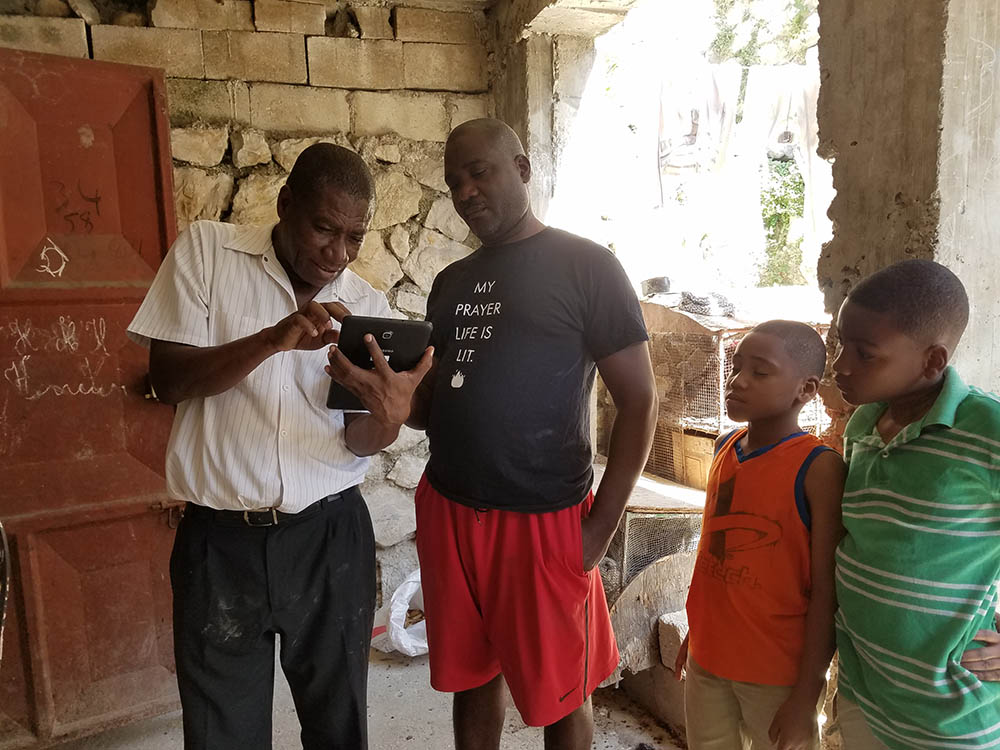Mobile Vector Surveillance? There’s an App for That
Mosquitoes are known for transmitting several dangerous diseases. But they are also the inspiration for an innovative new tool that can help with critical data collection.

From the Haiti pilot. The vector surveillance technician (L. Balthazar, holding the tablet) using the app to collect demographic information from the head of the household. Once community members saw how he entered their information into the app, they were eager to participate and volunteer their households for vector surveillance.
This August 20, many will be thinking about mosquitoes. Not just because they are a common summertime nuisance. It’s because this day marks World Mosquito Day, when 120 years ago, Sir Ronald Ross made his landmark discovery: malaria parasites could be transmitted from infected patients to Anopheles mosquitoes. However, for entomologists and vector (insects and other animals that transmit diseases) control technicians, mosquitoes are top of mind every day.
Today, mosquitoes are considered to be the most dangerous animals in the world, as they transmit several deadly and debilitating diseases, including malaria, dengue, yellow fever, lymphatic filariasis, chikungunya and the Zika virus. For these scientists, staying one step ahead of the mosquito is critical to better understand disease transmission, control, and eventually, elimination.

From the Dominican Republic pilot. The vector surveillance team (national level in white) performing a mosquito breeding site assessment in a home (homeowner in stripes) while the local surveillance technician (in green, holding the tablet) enters demographic information and results into the app. A member of CDC’s Epi Info team (J. Aponte, in gray) was also on hand to address any technical challenges during the pilot.
CDC’s emergency response to the recent epidemics of Zika catalyzed a team of scientists focused on Integrated Vector Management in the agency’s Division of Parasitic Diseases and Malaria and the agency’s Epi Info team to collaborate on a tool for data collection on disease vectors. Using CDC’s open source data collection software program, Epi InfoTM 7*, the Epi Info Vector Surveillance App was designed to improve data quality, standardize data for better comparisons among vector control programs, and save critical time in the field.
The app was designed for surveillance of all types of mosquito vectors: it facilitates collection of data on Aedes aegypti (the mosquito that transmits Zika, dengue, yellow fever, and chikungunya viruses); Culex mosquitoes (which transmit Filariasis and West Nile), and Anopheles mosquitoes (which transmit malaria).
The tablet-based wireless app has five data entry modules that support entry of data from: 1) mosquito trapping, 2) mosquito surveys, 3) cone bioassays, 4) the CDC bottle bioassay for insecticide resistance testing, and 5) vector control activities. The technology captures information by capitalizing on capabilities of modern tablets such as Global Position System (GPS) tracking and also has the ability to scan traditional barcodes and QR codes.
Once entomologists and vector surveillance techs enter surveillance data into the app, the data are uploaded to the Cloud, where they are then sent to an analysis dashboard. The dashboard automatically generates summaries, surveillance maps, visualizations and analysis of entomological indicators so decision-makers can quickly and in near real-time review their data and plan their appropriate responses about when, where, and how to begin vector control measures. By automating the analysis and display, users can focus on the more important issue of focusing on determining the right control method at the right place and time for maximum public health impact.
Currently, the app is in pilot testing status, and training of entomologists and vector surveillance technicians will continue through the end of October 2017. Training has already occurred in the Dominican Republic, Haiti, and Sierra Leone, and will soon occur in Trinidad & Tobago and Brazil. The app is currently available in three languages: English, Spanish and French (with a request from the Brazilian Ministry of Health for a Portuguese version). Pilot testing has proven to be so successful, that every country that has tested it plans to incorporate it into their national vector surveillance program.
Once the final pilot test is completed and all adjustments to the technology have been made, the app will be available for free download from the Google Play store, bringing this useful tool for vector control surveillance and control within reach for anyone with access to the Internet.
Learn more about what CDC is doing to control mosquitoes and the diseases they spread, such as malaria, lymphatic filariasis and other vector-borne diseases.
* Epi Info™ is a suite software tools designed for easy data entry form and database construction, a customized data entry experience, and data analyses with epidemiologic statistics, maps, and graphs for public health professionals who may lack an information technology background. Among its uses are for outbreak investigations; for developing small to mid-sized disease surveillance systems; as analysis, visualization, and reporting (AVR) components of larger systems.